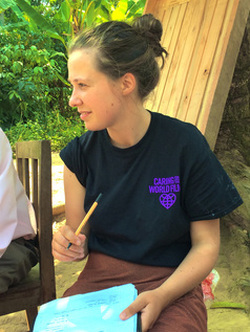 Associate Producer Anna Ashford
Associate Producer Anna Ashford From Director Debi Lang: I asked our Associate Producer Anna Ashford to submit a blog to share what the most valuable thing she learned while working with CFTWF
One of the most valuable experiences I took away from my month working for Caring for the World Films in Uganda was learning how to interview, and more importantly, learning how to interview ethically. As the Field Producer, (and also the owner of a British accent), Debi decided she would want me to conduct the interviews. I had never before worked on a film crew or in journalism so this experience was totally new to me. So what did I learn? The first, and most obvious, thing to learn about interviewing is to ask open questions, allowing the interviewees to give you the answer themselves and prevent meaningless “yes/no” answers. Furthermore asking open questions allows you to dig deeper, the most valuable cliché for any journalist. It is far easier said than done though I discovered. As we were sussing the ins and outs of how Nyaka AIDS Orphans Project works we had to dig deeper on numerous fronts, including several very sensitive ones; teenage pregnancies, family deaths and rape. So asking open questions is very important.
One of the most valuable experiences I took away from my month working for Caring for the World Films in Uganda was learning how to interview, and more importantly, learning how to interview ethically. As the Field Producer, (and also the owner of a British accent), Debi decided she would want me to conduct the interviews. I had never before worked on a film crew or in journalism so this experience was totally new to me. So what did I learn? The first, and most obvious, thing to learn about interviewing is to ask open questions, allowing the interviewees to give you the answer themselves and prevent meaningless “yes/no” answers. Furthermore asking open questions allows you to dig deeper, the most valuable cliché for any journalist. It is far easier said than done though I discovered. As we were sussing the ins and outs of how Nyaka AIDS Orphans Project works we had to dig deeper on numerous fronts, including several very sensitive ones; teenage pregnancies, family deaths and rape. So asking open questions is very important.
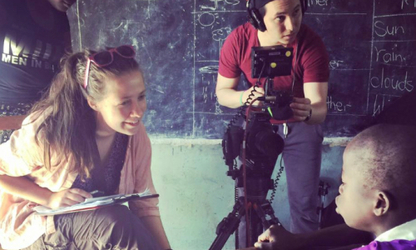 Anna interviews Michael, Nyaka Primary student.
Anna interviews Michael, Nyaka Primary student. This would however sometimes prove very difficult when interviewing some of the younger children of Nyaka or Kutamba Primary School. The young students, surrounded by alien "muzungu" [foreigner] faces, were shy and reluctant to give long answers. This in turn taught me the value of contact with the interviewee before the interview.
This is necessary for a couple of reasons, respect first and foremost. Simply meeting, taking an interview, and leaving expresses disinterest and apathy, discrediting the work of the interviewees, and simultaneously ours. The work that Nyaka AIDS Orphans Project is doing is worthy of boundless respect and thus getting to know the interviewee was profoundly important.
This is necessary for a couple of reasons, respect first and foremost. Simply meeting, taking an interview, and leaving expresses disinterest and apathy, discrediting the work of the interviewees, and simultaneously ours. The work that Nyaka AIDS Orphans Project is doing is worthy of boundless respect and thus getting to know the interviewee was profoundly important.
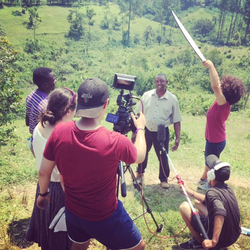
I saw this demonstrated most pertinently with interviewee Sempa Baker. Sempa has been involved with Nyaka from the beginning, hence beholden of a lot of valuable information. The first time we met Sempa, we spent the whole day with him, questioning him from breakfast through to lunch and then having him show us the water project in the afternoon. All of this was done without having a camera presence on him. We just wanted to get to know him and find out all of the information he could give us about the foundation, and more broadly Uganda itself. This meant that when we interviewed him 2 days later, we could appropriately formulate the questions we wanted to ask and have him feel comfortable with the crew. (It also meant he may have been more tolerable of the interview lasting longer than 3 hours…!)
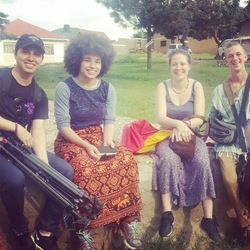 CFTWF crew Uganda 2015
CFTWF crew Uganda 2015 We saw that this approach of having contact with the interviewee helped during children’s’ interviews. When we went to Kutamba primary we allowed the students to be present for each others’ interviews and in order to gain familiarity around us. We did the same when interviewing the girls at Nyaka Vocational Secondary School. We conducted the interviews in the girl's dorm and the girls were more comfortable with their friends in the room, more prepared for their turn and even helped us out with the filming!
Editer's Note: The children we interviewed were extremely shy, never exposed to cameras or questioning by foreigners. It was extremely important to us that they be comfortable speaking to us. We found success when they had their friends in the room with them during the interview. Many times, the other students would ask each other thoughtful questions while being interviewed and it resulted in enlightening responses such as the segment regarding girl's hygiene products and the challenges associated. Some content above edited for clarity.
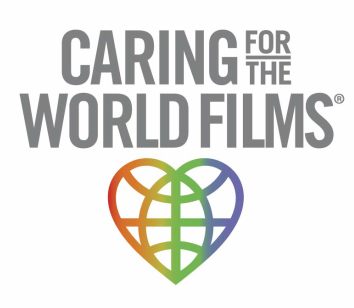
 RSS Feed
RSS Feed